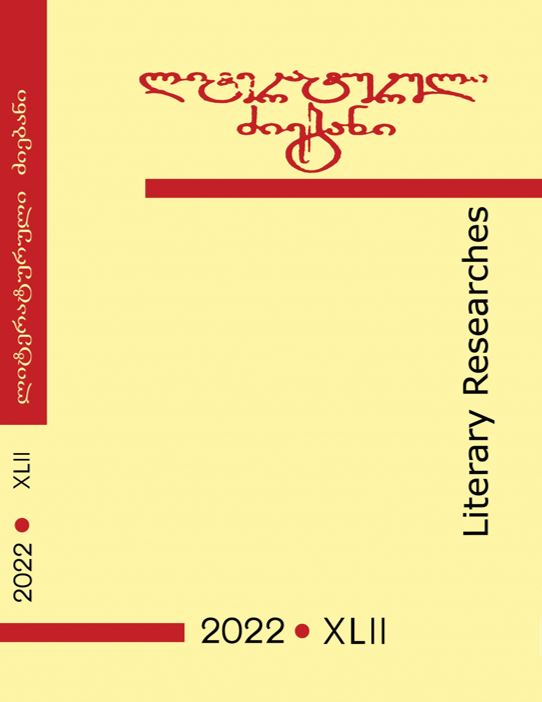Published 2022-04-30
Keywords
- 19th century,
- Georgian Literature,
- Georgian Criticism,
- Georgian Journalism,
- Aleksandre Orbeliani
How to Cite
Abstract
Aleksandre Orbeliani is one of the most interesting representatives of Georgian literature of the nineteenth century. He has worked in several fields of literature – poetry, prose, drama, criticism and journalism. Aleksandre Orbeliani’s literary abilities were most clearly revealed in his critical works. Since the 1850s, he has published a number of articles about both general
literary issues and the works of particular writers.
Aleksandre Orbeliani’s article about Grigol Rcheulishvili’s story “Widow’s Lemons” is noteworthy. In this work, the critic discusses the specifics of the historical fiction in general and points out the inconsistencies that greatly diminish the artistic value of Rcheulishvili’s story. The stories of the prose writer Grigol Rcheulishvili, quite popular among contemporaries, due to their bold approach to historical themes, often caused the displeasure
of the Georgian aristocracy, including Alekandre Orbeliani, who criticizes the writer for distorting the historical past of Georgia. The critic deeply believes that historical truth must be scrupulously preserved in a work created on a historical theme. In his opinion, Grigol Rcheulishvili’s story cannot answer these requirements even a little.
Aleksandre Orbelian’s heartache is mainly caused by the writer’s interpretation of King Erekle’s character. The name of his own grandfather, King Erekle, was most precious to the critic. That is why he cannot hide his displeasure, because he thinks that the writer is saying an “insulting word” about him.
Aleksandre Orbeliani is outraged by the circumstances, in Rcheulishvili’s story, King Erekle, this historical hero and great commander-in-chief, is presented as a mediator between the lovers. Aleksandre Orbelian considers the tone and behavior of Erekle, to be completely inappropriate (toothless jokes, secretly listening to lovers). Alexander Orbeliani cannot forgive Grigol Rcheulishvili for posting the words that a peasant from Kartli allegedly said to Erekle: “step father of Kartli and father of Kakheti”. According to the critic, none of the peasants could dared to say these words to the king, and this story was actually invented by Erekle’s enemies.
In the article “Attached to the Attachment”, the critic discusses Daniel Chonkadze’s “Suram Fortress” and does not share the artistic concept of the story. Aleksandre Orbeliani does not consider it right to criticize the nobility as a separate social stratum. According to him, the writer should be interested
in more general, ethical problems.
It is noteworthy that Aleksandre Orbeliani notices the emergence of two main currents in Georgian public thought, the birth of two groups, which he conventionally calls “conservatives and progressives.” The critic considers this event as a completely natural and welcome fact.
The fate of the Georgian language, its present and future was one of the main thoughts of Aleksandre Orbeliani. In his article “A Few Words on Comedy “Divorce”, Aleksandre Orbeliani questions Platon Ioseliani’s views on Giorgi Eristavi’s linguistic innovation. Orbeliani points out that it is impossible to generalize the language of Giorgi Eristavi’s comedies in all realms of written speech, as it is suitable for works of the comedy genre and in
no case can it claim a common literary language. At the same time, the critic acknowledges the need for a unified literary language.
Aleksandre Orbeliani is one of the most prominent figures in Georgian literature of the 1850s, and together with Nikoloz Berdznishvili and Mikheil Tumanishvili, he stands at the forefront of nineteenth-century Georgian literary criticism.

